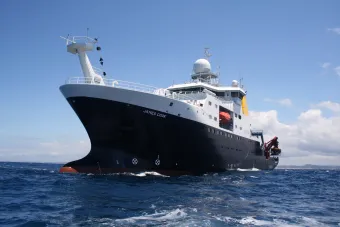
- A special issue of Oceanography released has shone a spotlight on the collaborative FindAScienceBerth project, inspiring people and institutions to make positive change.
The FindAScienceBerth project is championed by scientists from organisations including the National Oceanography Centre (NOC), British Antarctic Survey (BAS) and the University of Glasgow, who are members of the Challenger Society for Marine Science’s (CSMS) UK-wide equity, diversity, inclusion, and accessibility (EDIA) working group. The project will open up more opportunities for early career researchers and technicians, particularly from traditionally excluded groups.
Berths for scientists on research ships are often in short supply, with participation often limited to specific networks within the discipline, which can be limiting for those pursuing careers in marine science. The CSMS EDIA team are coordinating action to address the causes of exclusion and to improve representation across the discipline by providing a user-friendly interface between chief scientists and anyone seeking opportunities to participate in cruises.
NOC’s Dr Alice Marzocchi, a co-lead of FindAScienceBerth, and case study for the background of the project proposal, explains: “Gaining shipboard experience is extremely valuable for early career marine science researchers, including myself. I did my MSc at the University of Southampton in 2011 and for my dissertation I worked with scientists from the NOC, which led to a fantastic opportunity later on to join a research expedition, which was quite a lucky and unique opportunity as it would have been rather difficult for me to join such an expedition through my PhD network. With the FindAScienceBerth project, we aim to open up these opportunities more broadly, going beyond fortuitous connections and existing personal networks that are not equally available to everyone.”
Professor Kate Hendry, from British Antarctic Survey who launched the CSMS EDIA Working Group in 2021 said: “Sea-going experience doesn’t only give researchers the opportunity to put their work in context, but it can really launch careers. I was invited on an expedition just as I was coming to the end of my PhD studies. The expedition took me to sea for the longest I’d ever been before (about six weeks), and it gave me so many exciting opportunities to learn from a fantastic team. The samples I collected went on to form the basis of a paper, and then a successful postdoctoral scholarship application! The work expanded and very much launched my career. I’m forever grateful for the opportunity and I hope that some of our initiatives in the Challenger Society and the Find A Science Berth project will support others in a similar way.
Ben Fisher, a co-chair for the CSMS EDIA working group from the University of Edinburgh and author of the Oceanography feature said: “This article brings together work completed by members of the Challenger Society EDIA working group over the past few years. We are excited to share our perspectives from establishing this group and leading projects such as FindAScienceBerth. We hope that contributing towards this international collection of articles will facilitate the sharing of best practice among groups similar to ours. The working group continues to focus on ways to improve inclusion in marine science and wishes to engage with a wide range of people, we encourage anyone who is interested in playing a part to get in touch.”
Read the special issue article.
About CSMS EDIA
NOC’s Dr Alice Marzocchi and Dr Chelsey Baker are active members of the CSMS EDIA formed in 2021. Through initiatives such as FindAScienceBerth project, the working group aim to promote diversity monitoring and actions to improve representation and inclusion in UK marine sciences. The group have a particular focus on racial diversity, under-represented socioeconomic groups, and intersectionality.